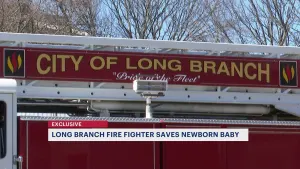More Stories
June is Post-Traumatic Stress Awareness Month, and one organization is hoping to use specially-trained service dogs to improve and save the lives of returning combat veterans.
A 2016 study by the Department of Veterans Affairs found that 20 veterans die by suicide every day in the United States.
Veteran David Crenshaw says that he could have been in that statistic. But he says that thanks to K9s for Warriors, he now has the life he always should have had.
“I joined the military at 17, entered public service at 18 and was off to war by 20, 21 - I was a young kid, what did I know?” Crenshaw says. “My only orientation in life was service, conflict, combat.”
Crenshaw is a 20-year retired Master Sergeant with the Army National Guard. He served as a protective service agent in Iraq. He says that he returned from combat with severe PTSD.
“The last words I really heard, were, ‘You're highly functioning.’ What I didn't bring home and tell anybody, was that she said my demise was going to be because of my service,” Crenshaw says.
According to the United States Department of Veterans Affairs, at least 20% of veterans of the Afghanistan and Iraq wars suffer from PTSD, along with 12% of Gulf War veterans and nearly 300,000 Vietnam War veterans.
“No matter how much the military trains you to succeed, or the police train you to succeed, no one trains you to fight that mental fight that you need to have,” Crenshaw says.
In search of help, Crenshaw applied to K9s for Warriors, an organization that trains rescue dogs to be service animals for veterans suffering from PTSD. Crenshaw was paired with now 4-year-old "Doc,” a German short-haired Springer black Lab mix. He says Doc has made a huge impact on his life, making it easier for him to handle daily tasks.
“It's been a huge calming effect. I don't have to be on guard,” Crenshaw says.
Crenshaw says because of his own experience with PTSD, he now better understands why the number of veterans who die by suicide daily continues to rise.
“I can understand why someone sees that as an outlet, why that's their only option,” he says. “I never wanted that for me and I never wanted that for my kids.”
Most of the service dogs come from high-kill shelters. It takes a minimum of six months to train a dog. It costs about $30,000 in donations.
The waitlist to get a dog is several years long. Crenshaw got Doc a year after he applied.
More from News 12

Send us your positive story ideas!
2:43

‘Now he literally has a part of me.’ Brother donates part of his liver to twin
3:08

Healing together: The Hubb in Newark allows young people to process trauma through creativity
2:15

Long Branch firefighter saves life of 6-day-old baby in distress
1:43

Plainfield schools team with Project Ready for pop-up museum to celebrate Black History Month
3:32
